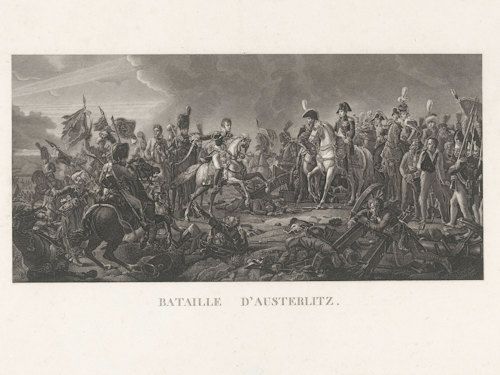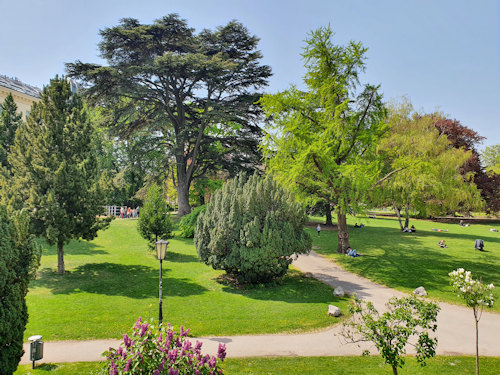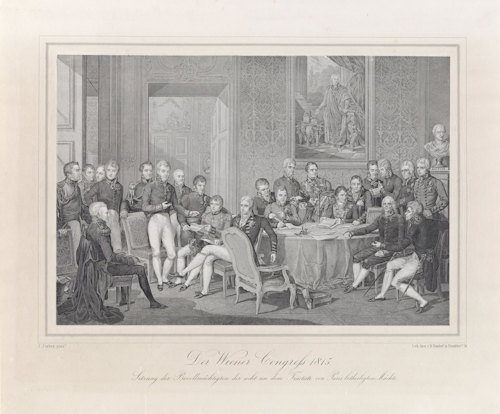
In 1804, hundreds of years after Rudolph I first marched into Vienna and liked the look of the place, the unofficial Habsburg “empire” became an actual official empire. Its name? The Austrian Empire.
But why the sudden need for formality?
- Threat of Napoleon drove decision
- Franz I was the first Emperor of Austria
- Book a tour* of the Habsburg capital
- See also:
- Previous: The Holy Roman Empire
- Next: Austria-Hungary
How to stay an Emperor
What happened was that Franz II, Holy Roman Emperor, and also ruler of various Habsburg lands, saw the writing on the wall when a certain Napoleon Bonaparte developed imperialist tendencies.
Given Napoleon’s ambitions, the days of the Holy Roman Empire seemed numbered. And such a development would lead to an alarming gap on Franz’s résumé: no more empire would mean no more calling yourself emperor. The horror!

(Emperor Napoleon I and his staff on horseback, Horace Vernet, 1810 – 1850. Image courtesy of the Rijksmuseum)
In 1804, as part of contingency plans for Napoleon potentially causing havoc in Europe, Franz declared his own lands were now collated within a new entity: the Austrian Empire. He gave himself an official crown and the hereditary title of Emperor.
Better safe than sorry, you might say. Nobody wants to become demoted to just a King when you’ve been used to being a Holy Roman Emperor (regardless of how many different places you may be King of).
More than just vanity motivated Franz, however. A formal, standalone empire would be politically more robust and more likely to survive any Napoleonic troubles relatively intact and independent. At least in theory.
The plan sort of worked, too.

(Battle of Austerlitz, 1805, anonymous, 1805 – 1899. Image courtesy of the Rijksmuseum)
In 1805, Napoleon beat the Austrians and Russians at the battle of Austerlitz. In the aftermath, Franz ceded various possessions to the French Emperor and his allies.
And in July 1806, Napoleon established the Confederation of the Rhine: a collection of German states under French hegemony.
Membership of the Confederation saw all these German states leave the Holy Roman Empire, representing a death blow to that particular political grouping. In August 1806, Franz abdicated as Holy Roman Emperor and dissolved the Holy Roman Empire.
However, thanks to his advanced planning, Emperor Franz II (his title as head of the Holy Roman Empire) still remained Emperor Franz I (his title as head of the “new” Austrian empire he’d called to life two years previously).

(Johann Hieronymus Löschenkohl (publishing house), Emperor Franz II. from 1792 to 1806, Emperor Franz I. from 1804; Wien Museum Inv.-Nr. 90518; excerpt reproduced with permission under the terms of the CC0 licence)
Unfortunately for the “new” Emperor, the contingency plan didn’t work out entirely as intended.
The Austrian Empire did indeed survive, but not without a few losses.
Napoleon continued his expansionist efforts and his nasty habit of winning battles; negotiations over territorial integrity can be difficult when you have a persuasively-large French army on your doorstep.
Ongoing conflicts with France led to peace treaties that saw more of the Habsburg territories removed from the family’s rule. The 1810 marriage of Napoleon to Franz’s eldest daughter, Marie Louise, cemented an eventual (short-lived) alliance.

(Vienna’s Burggarten park owes its existence to Napoleon)
The French emperor left his mark on Vienna in many other ways. For example…
- The Austrians built the Burggarten park in space cleared by retreating French soldiers in 1809
- Napoleon once owned the carriage Empress Elisabeth used to enter Vienna after her engagement to Emperor Franz Joseph. It’s now in the Imperial Carriage Museum
- The precious metal cot for Napoleon and Marie Louise’s son sits in Vienna’s Imperial Treasury
Fortunately for Franz, European history is like a never-ending game of snakes and ladders: one minute you’re on top, the next you’re not.

(Delegates to the Congress of Vienna, deciding the future of Europe. Photo courtesy of the Rijksmuseum)
Napoleon’s eventual defeat allowed Austria and his other enemies to reorganise borders again more favourably at the famous Congress of Vienna in 1814/1815.
However, despite Napoleon’s removal from the chess board of European politics, the Austrian Empire still didn’t last all that long; it became the Austro-Hungarian Empire in 1867.